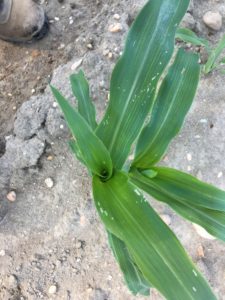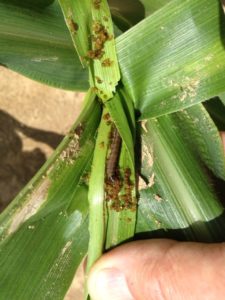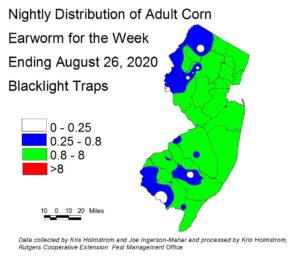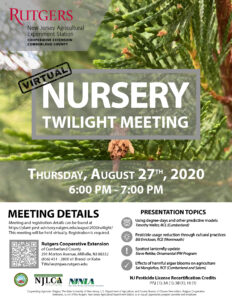Sweet Corn
European corn borer (ECB) adults continue to be very low, and no map will appear in this edition.
The highest nightly trap catches of ECB for the week ending 8/26/20 are as follows:
| Cinnaminson 1 |
| Downer 1 |
| Medford 1 |

 Fall armyworm (FAW) larval infestations have stabilized at low to moderate levels. Infestations generally are in the teens to low 20% range, but FAW could increase dramatically with the arrival of storms, resulting in significant injury to whorl and even seedling stage corn. Injury from newly hatched larvae shows up as “window panes” or areas where leaf tissue has been eaten down the the lower epidermis (see photo at far left). This injury leads down into the whorl. As larvae gain size, they begin to consume leaf tissue in its’ entirety, creating ragged holes and lots of droppings (see photo at near left). FAW can be tough to manage because it is resistant to synthetic pyrethroid insecticides (IRAC 3A) and because larvae are often covered by their own droppings, making contact with the insecticide more difficult. Treat when 12% or more plants exhibit FAW injury alone, or in combination with ECB injury.
Fall armyworm (FAW) larval infestations have stabilized at low to moderate levels. Infestations generally are in the teens to low 20% range, but FAW could increase dramatically with the arrival of storms, resulting in significant injury to whorl and even seedling stage corn. Injury from newly hatched larvae shows up as “window panes” or areas where leaf tissue has been eaten down the the lower epidermis (see photo at far left). This injury leads down into the whorl. As larvae gain size, they begin to consume leaf tissue in its’ entirety, creating ragged holes and lots of droppings (see photo at near left). FAW can be tough to manage because it is resistant to synthetic pyrethroid insecticides (IRAC 3A) and because larvae are often covered by their own droppings, making contact with the insecticide more difficult. Treat when 12% or more plants exhibit FAW injury alone, or in combination with ECB injury.
 Corn earworm (CEW) moth captures have increased in central and southern New Jersey blacklight traps over the past week. Trap catches, both blacklight and pheromone, are showing signs of a possible large increase within a week. The current population poses a significant risk to silking corn. Catches remain somewhat variable (see map at left), with green areas on this map representing a 3-day spray schedule. Note that there continues to be disagreement between blacklight and pheromone trap maps with regard to the southwestern counties. See pheromone trap information below.
Corn earworm (CEW) moth captures have increased in central and southern New Jersey blacklight traps over the past week. Trap catches, both blacklight and pheromone, are showing signs of a possible large increase within a week. The current population poses a significant risk to silking corn. Catches remain somewhat variable (see map at left), with green areas on this map representing a 3-day spray schedule. Note that there continues to be disagreement between blacklight and pheromone trap maps with regard to the southwestern counties. See pheromone trap information below.
The highest nightly trap catches of CEW in black light traps for the week ending 8/26/20 are as follows:
| Georgetown 13 | New Egypt 5 | Matawan 4 |
| Green Creek 11 | Princeton 5 | Morristown 4 |
| Farmingdale 8 | Crosswicks 4 | Allamuchy 3 |
| Allentown 5 | Denville 4 | Hillsborough 3 |


